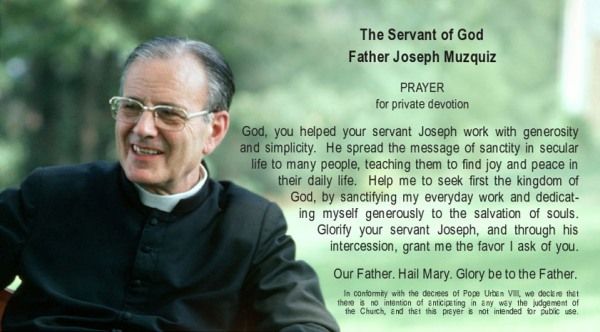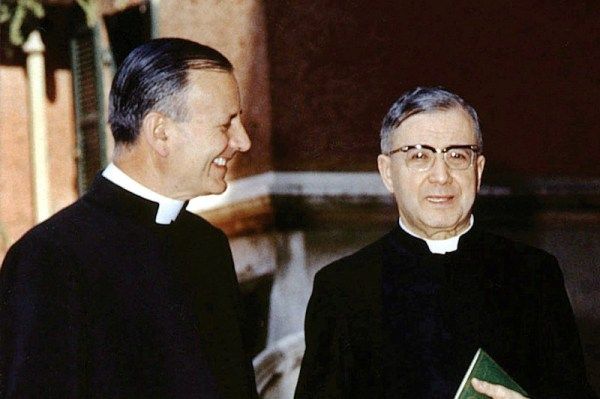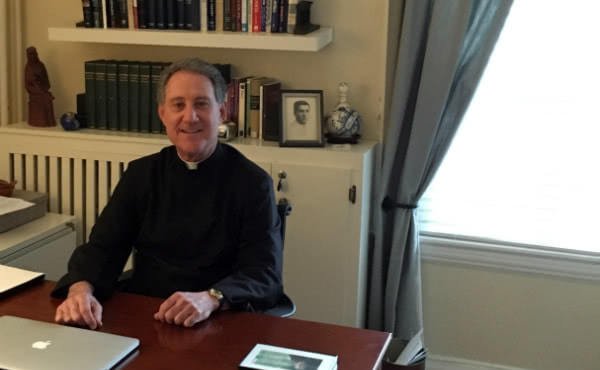1. The canonization cause of Fr. Joseph Muzquiz was opened five years ago. What is the status of his process now?
The diocesan phase of the cause of Fr. Joseph, which officially opened 5 years ago on June 2, 2011, was brought to a conclusion in a solemn act by Cardinal O’Malley on May 22, 2014. The Acts, that is the oral and documentary evidence collected in this investigatory process pertaining to the issues/questions of whether Fr. Joseph lived the virtues heroically and whether he has intercessory power before God, were then sent to the Congregation for the Causes of Saints in Rome. The Congregation subsequently issued a decree of validity regarding the diocesan phase, and has accordingly proceeded to the Roman phase, which is currently underway. This entails the study of the cause leading to a definitive judgment.
2. Has his reputation for holiness been growing since his cause was opened?
After the opening of Fr. Joseph’s cause of canonization, a growing number of people have had an opportunity to learn about him, and have been inspired by his life and have experienced the power of his intercession. For many their initial exposure to Fr. Joseph is through a short biography entitled “Putting Down Roots,” and the documentary “Everyday Holiness” which is aired regularly on TV. All of this and more information, such as recent favors, are available at the official web site for his cause: https://www.josephmuzquiz.org/
3. Could you give us some specific examples of this widespread devotion?
It never ceases to amaze me the variety of people who pray to Fr. Joseph. We receive favors from people of very different backgrounds…and not only from the US but from all over the world: one day, a mother from Massachusetts narrated the conversion of her children; another day it's a young woman who had been looking from an apartment in Spain; a doctor in Texas whose young patient just got cured; grateful parents in Miami whose baby, after a difficult pregnancy, was born well…or a student in Trinidad who wants to share with us how Fr. Joseph helped her to sell a van.
I guess I shouldn’t be surprised as Fr. Joseph was such a globetrotter, and in his pastoral ministry he helped people of all walks of life.

4. What types of favors are people receiving from their recourse to Fr. Joseph’s intercession?
One striking characteristic of Fr. Joseph’s intercession is that many people, after praying to him remark that “he works fast,” which was certainly true of him while on this earth. Whenever he had to do something, he did it without delay. It seems that now when someone needs help, they get it fast too!
You can see this continuity between what he did and what he continues to do in the favors granted through his intercession: in addition to medical favors there are many people who report having been helped to solve their housing needs by finding the right place at the right price, or obtaining the money to finance it.
We have also received reports of people getting help with their studies, looking for work, or solving some pressing financial need.
Other favors involved the solution to technical and computer problems, not surprising since Fr. Joseph was an engineer, or the solution to small challenges of daily life like finding a parking spot in a crowded street of Manhattan.
Finally, Fr. Joseph in life cared much for the sanctity and needs of his brother priests and now he does it through his intercession.
5. Are young people being helped in a special way by Fr. Joseph?
Already in life Fr. Joseph showed a great interest in young people. They found in him someone who understood them, and he was instrumental in helping many find their vocation. A high percentage of the accounts of favors received in this office come from students and young people beginning their professional career and married lives.

6. What were some of the specific characteristics of Fr. Joseph’s struggle for sanctity?
The words that immediately come to my mind when I think of the person of Fr. Joseph are: ordinary, joy, peace, simplicity, deep interest in you as a person, and complete forgetfulness of himself. I think the words on the prayer card express very well the essence of the particular path he was called to and followed. He worked with great generosity, simplicity, constancy, and joy in the ordinary duties of each day. This is how he lived out his vocation to be and do Opus Dei.
As a priest sent by St. Josemaría to establish Opus Dei in the United States, he opened the minds and hearts of many many people to seek holiness in the middle of the world. He taught this message to people in the only way that it could really take root in them: namely, by a living example of a way of life they could actually follow, which let them “taste and see” the joy and peace in his own life, the fruit of his total self-giving.
